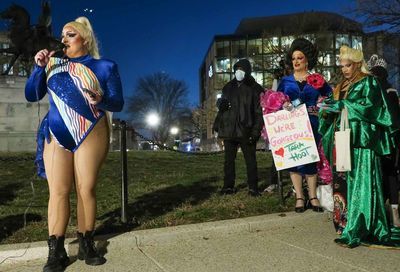Trump’s ‘Unalienable Rights’ commission brands LGBTQ equality a ‘divisive social and political controversy’
The State Department commission emphasized "religious freedom" and criticized courts for extending rights to people

A draft report by the Trump administration’s Commission on Unalienable Rights elevates religious freedom over LGBTQ rights and calls same-sex marriage a “divisive” controversy.
The commission was formed last year by Secretary of State Mike Pompeo with the intention of examining the role of human rights in America’s foreign policy.
“What does it mean to say or claim that something is, in fact, a human right,” Pompeo said at the time. “How do we know or how do we determine whether that claim that this or that is a human right, is it true, and therefore, ought it to be honored?”
He added: “Words like ‘rights’ can be used for good or evil.”
But critics feared that the commission, which included anti-LGBTQ figures, would instead be used to try and roll back protections for LGBTQ people.
Read more: Trump administration’s “Unalienable Rights” commission may roll back LGBTQ protections
The Human Rights Campaign noted the “unusual language” surrounding the commission at the time of its creation, calling it “an attempt to pull back a U.S. human rights vision that we’ve had for decades and create this new vision that uses these new terms like ‘unalienable rights’ or ‘natural rights’ or ‘natural law.'”
HRC added: “These are all things that have been used by extremist people on the far right, to create a gap between what they consider unalienable rights and alienable rights.”
According to the commission’s draft report, released last week, those fears weren’t unfounded.
Documenting a human rights “crisis,” the commission argues that various rights extended in recent years conflict with other rights found in documents such as the Declaration of Independence and Universal Declaration of Human Rights.
As such, certain rights should be elevated above others — including religious freedom, a term often used by social conservatives to justify discriminating against LGBTQ people — while “new claims of rights” between “competing groups” should be “left up to resolution through ordinary democratic processes.”
“The tendency to fight political battles with the vocabulary of human rights risks stifling the kind of robust discussion on which a vibrant democracy depends,” the commission argues.
Related: Anti-gay activist wants Trump’s human rights commission to reverse LGBTQ rights globally
Other than ambiguous terms regarding rights, the report refrains from referencing LGBTQ people, sexuality or gender identity at all, except for branding same-sex marriage — along with abortion and affirmative action — a “divisive” controversy.
“In divisive social and political controversies in the United States — abortion, affirmative action, same-sex marriage — it is common for both sides to couch their claims in terms of basic rights,” the commission writes.
It then ominously argues that claims of human rights have “given rise to excesses of its own,” and that “not every right that democratic majorities choose to enact is therefore unalienable.”
The commission also slams the judiciary for making decisions on human rights — as the Supreme Court has with legalizing same-sex marriage nationwide and determining that the Civil Rights Act protects LGBTQ people from employment discrimination.
Calling “a contestable political preference” a right and seeking a “final and binding judgment from a court” tends to “choke off democratic debate, which is itself critical to self-government and therefore to the protection of unalienable rights,” the commission writes.
The Human Rights Campaign, the nation’s largest LGBTQ organization, called the report “flawed” and said it “shows no serious efforts to advance human rights.”
“From day one, the Trump-Pence administration has been retreating from and undermining the global framework for human rights established in the Universal Declaration of Human Rights in 1948,” HRC Government Affairs Director David Stacy said in a statement.
“As was clear from the start, Secretary Pompeo’s Commission on Unalienable Rights was designed to challenge the international consensus with a narrow view of human rights, that among other things would leave LGBTQ people even more vulnerable to violence and discrimination.”
Stacy continued: “Representation on the commission was designed to produce this flawed report, excluding human rights experts from inside and outside the government. And even in the release today of the draft report during a pandemic, the public event allowed limited access and no remote viewing options. No one should take this report as a serious effort to advance human rights.”
Tarah Demant, director of the Gender, Sexuality, and Identity Program at Amnesty International USA, said that the U.S. government “cannot unilaterally redefine which human rights will be respected and which will be ignored.”
“The U.S. State Department’s effort to cherry-pick rights in order to deny some their human rights is a dangerous political stunt that could spark a race to the bottom by human rights-abusing governments around the world,” Demant said in a statement.
“The administration is seeking to create a hierarchy of rights, where it gets to decide which rights are ‘unalienable’ and which rights are what it calls in the report ‘divisive social and political controversies,’ a category which predictably includes sexual and reproductive rights and LGBTI rights.
“Human rights are not a choose-your-own-adventure in which the U.S. government gets to pick a different ending because it doesn’t like a particular set of rights. This report, made through an illegitimate process, only further shows the contempt this administration has for human rights and its desire to excise certain rights.”
Speaking to Mother Jones, Jayne Huckerby, director of the International Human Rights Clinic at Duke Law School, said that the draft report “elevates religious freedom as an unalienable right, while dismissing abortion and same-sex marriages as not rights but instead ‘divisive social and political controversies.'”
Huckerby said the report simultaneously “recognizes that legally there should be no hierarchy between different types of rights” while still calling for “US foreign policy to de-emphasize economic and social rights compared with civil and political ones.”
The Freedom From Religion Foundation, which advocates for atheists, agnostics, and non-theists and the separation of church and state, branded the report “Christian Nationalism” in a statement.
“The report is Christian Nationalism in print and stamped with government authority, granting the State Department permission to conduct a Christian Nationalist foreign policy,” the Foundation said. “That means not supporting the rights of the LGBTQ community, giving Christian Nationalists a blank check to proselytize, restricting access to HIV/AIDS medications and abortion, and permitting the direct funding of houses of worship abroad.”
It added: “This report is both political and highly religious. The report’s dangerous conclusion is based on the flawed premise that all human rights ‘came from our Lord,’ as Pompeo told a group of conservative women last fall.
“This common Christian Nationalist talking point is based on a misreading of the Declaration of Independence, which states that ‘all men’ are ‘endowed by their Creator with certain unalienable Rights.’ Pompeo’s name for this commission tipped his hand from the outset, showing his intent to misuse this phrase to justify trampling others’ rights in the name of his religion.”
Read more:
Hallmark Channel in ‘active negotiations’ for LGBTQ-inclusive holiday films
Path to Victory: Annise Parker on helping elect LGBTQ people across America
San Francisco supervisors to ease restrictions that would allow bathhouses to return to the city
[bookshelf id=’2′]
Support Metro Weekly’s Journalism
These are challenging times for news organizations. And yet it’s crucial we stay active and provide vital resources and information to both our local readers and the world. So won’t you please take a moment and consider supporting Metro Weekly with a membership? For as little as $5 a month, you can help ensure Metro Weekly magazine and MetroWeekly.com remain free, viable resources as we provide the best, most diverse, culturally-resonant LGBTQ coverage in both the D.C. region and around the world. Memberships come with exclusive perks and discounts, your own personal digital delivery of each week’s magazine (and an archive), access to our Member's Lounge when it launches this fall, and exclusive members-only items like Metro Weekly Membership Mugs and Tote Bags! Check out all our membership levels here and please join us today!

























You must be logged in to post a comment.